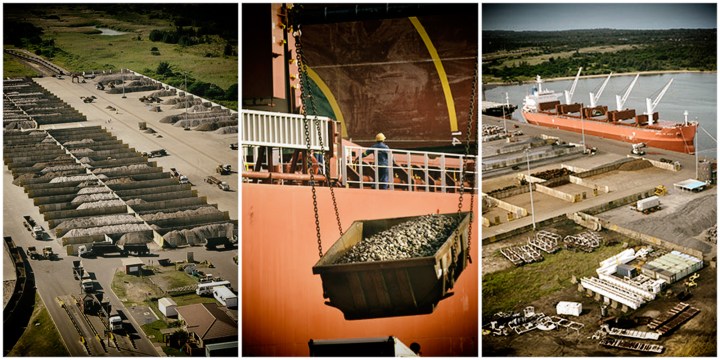PORT TRAFFIC SOLUTION
Transnet says ‘test’ has reduced coal truck congestion in Richards Bay

State-run logistics company Transnet says a test – which involves an ‘injection’ of more locomotives – has reduced the massive congestion of trucks moving coal for export to the Richards Bay Coal Terminal. While Transnet cautions that long-term success hinges on ‘ongoing processes’, it is clearly a positive development.
Transnet said it had increased the number of trains serving the rail link to the Richards Bay Coal Terminal (RBCT) from 21 to 28 a week, “supported by an injection of locomotives”.
This “injection” remains in its test phase, but it seems the patient is responding.
“As of 31 March 2024, the test train initiative had seen Transnet Freight Rail (TFR) moving 106,000 tons from road to rail, while removing approximately 3,100 truckloads from the roads (6,200 truck movements, including the empty leg),” Theo Johnson, Acting Managing Executive on the North Corridor, said in a statement on Thursday.
The “empty leg” refers to the return trip up the N2 to the coal collieries.
Transnet did not provide the precise timeframe for this reduction of 6,200 trucks offloading coal and heading back to load more, nor did the statement say where the “injection” of locomotives had come from. The SOE had not responded to our queries on this before publication.
Still, it’s clearly a positive development as the logistics crisis is one of many constraints on economic growth, including its impact on coal exports.
South African coal exports via RBCT fell in 2023 to 47.21 million tons, the lowest volume in more than three decades, as TFR’s woes mounted.
Read more in Daily Maverick: SA coal exports at 30-year low but mining sector appreciates Transnet’s new top brass
The rise of trucking as an alternative – provided by the private sector in the face of state failure – has increased costs for South African coal producers, while making the N2 corridor through northern KwaZulu-Natal to Richards Bay a pain in the ass at best and a lethal hazard for other road users at worst.
This in turn has almost certainly had a detrimental – if unquantified – impact on the region’s once flourishing and labour-intensive eco-tourism sector. The wheels of state failure leave many potholes in their wake.
“To date, seven customers, a majority of whom were 100% on-road before, have been tested.
“The process to test the remaining customers is ongoing, subject to available capacity on a week-by-week basis,” Johnson was quoted as saying in the statement.
Transnet noted that the test remains just that, and will hinge on long-term capital commitments.
“The test train initiative was offered with a clear proviso that it does not constitute a commitment for rail capacity in the long term, as there are structured ongoing processes for capacity allocation,” it said.
This effectively means that talks are ongoing with bankers and other sources of finance at a time when the coal sector overall is slowly being starved of capital because of its links to climate change.
Still, it’s a positive if tentative development on the logistics front.
The Minerals Council South Africa has estimated that, between 2021 and 2023, South Africa lost out on close to R100-billion from coal and iron ore exports alone, which equates to roughly 1.4 percentage points of GDP over three years.
Read more in Daily Maverick: South Africa’s economic meltdown in three charts
“There are increasingly positive developments in the logistics sector, which indicate the work the Minerals Council and its members are doing with and through Business for South Africa and the Presidency-led NLCC is gaining traction,” the Minerals Council said in response to Daily Maverick’s queries on the issue.
“For bulk commodity producers, which have lost an estimated R98-billion in export revenue since 2021, an efficient, functional and cost-competitive railway is essential for all stakeholders and customers.”
New Transnet group CEO Michelle Phillips said last week that data showed positive developments, indicating the SOE was starting to recover, albeit at a glacial pace.
Read more in Daily Maverick: Transnet turnaround looks promising, but set to be a long-haul
This later data set highlights the point that this improvement is tentatively on track. DM















